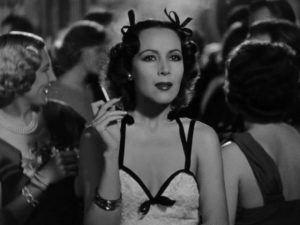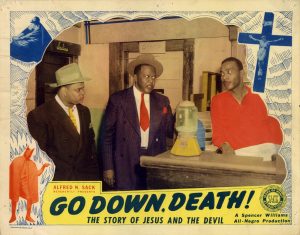THE WORLD, THE FLESH AND THE DEVIL
Ranald MacDougall (U.S. 1959) 95 min. 35MM. With Harry Belafonte, Inger Stevens, Mel Ferrer.
The World, the Flesh and the Devil’s mixed critical reception may be attributed in part to its racial-political angle. Its post-nuclear survivor tale entertains the possibility of interracial love and sex, and Harry Belafonte, in the starring role, takes up arms against white aggressors. It was one of two films released in 1959 by Belafonte’s HarBel Productions (the first Black-owned and “branded” Hollywood production company), a few years after he became the thirteenth African American to appear on the cover of Time magazine.
TOP OF PAGE
Friday, September 2 at 3pm
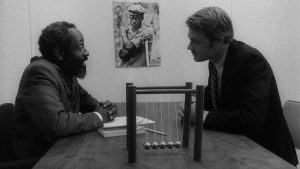
PUTNEY SWOPE
Robert Downey Sr. (U.S. 1969) 85 min. 35MM. With Arnold Johnson, Laura Greene, Buddy Butler.
The most popular film by Robert Downey Sr. is this offbeat classic about the antics that ensue after Putney Swope, the token black man on the board of a Madison Avenue advertising agency, is inadvertently elected chairman. Putney summarily fires the whiteys, replaces them with Black Power apostles, renames the company Truth and Soul, Inc., and proceeds to wreak politically incorrect havoc.
TOP OF PAGE
Friday, September 9 at 3pm
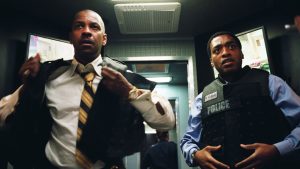
INSIDE MAN
Spike Lee (U.S. 2006) 129 min. 35MM. With Denzel Washington, Clive Owen, Jodie Foster.
A cerebral crime thriller with star power, Inside Man is an unusually mainstream “Spike Lee Joint”: a bank job heist with a mystery at its core. Though absent the overt polemics of Do the Right Thing or Chi-Raq, this is a genre film whose treatment of skin color, and a racially tense post-9/11 New York City, hides subversion beneath its glossy surface. As Manohla Dargis reminds us, Lee’s “insistence that race matters has cost him dearly with the mainstream (i.e., white) audience. He’s right, of course, that race matters, which is why, in between plot points and star turns, he gently and, at times, rather hilariously, insists on reminding us that it does.”
TOP OF PAGE
Friday, September 16 at 3pm
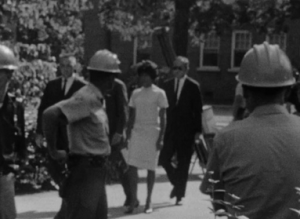
CRISIS: BEHIND A PRESIDENTIAL COMMITMENT
Robert Drew (U.S. 1963) 52 min. 16mm.
Three years after Robert Drew’s breakthrough documentary following JFK through the Wisconsin presidential primary, the President, recognizing the historical significance of the Direct Cinema approach, permitted Drew to film during a period of crisis: the showdown between Alabama Governor George Wallace and the federal government over the integration of the University of Alabama. Drew had teams at the Oval Office, the Justice Department and the University, capturing the human details of a drama deeply affecting the country, the civil rights movement and the presidency. Preserved by the Academy Film Archive. Playing with Perfect Film (Ken Jacobs, 1986, 22 min. 16mm), a radical gesture in found footage composed of an unedited reel of interviews with eyewitnesses to the assassination of Malcolm X.
TOP OF PAGE
Friday, September 23 at 3pm
DEVIL’S PLAYGROUND
Erle Kenton (U.S. 1937) 74 min. 35MM. With Dolores del Río, Richard Dix, Chester Morris.
In this Columbia Pictures remake of Frank Capra’s Submarine (1928), 20s and 30s Hollywood star Dolores del Río plays a Mexican dancer who weds one officer and seduces another. While the Mexican actress was widely considered one of Hollywood’s most beautiful faces, her racial difference influenced casting and critical reception. For Devil’s Playground, her 24th film and a commercial flop, her predatory role–a manifestation of negative stereotypes–led one reviewer to remark that her part “exactly fits her talents and her looks. She is uncomfortably real.”
TOP OF PAGE
Friday, September 30 at 3pm
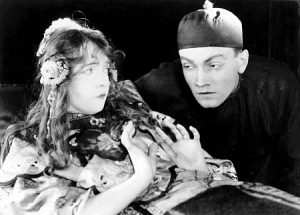
BROKEN BLOSSOMS
D.W. Griffith (U.S. 1919) 90 min. 35MM. With Richard Barthelmess, Lillian Gish, Donald Crisp.
D. W. Griffith reached a pinnacle of expressiveness in this tragic tale of love and suffering in the seedy Limehouse district of London. A Chinese man travels to England to spread the pacifist teachings of the Orient and meets the luminescent Lillian Gish, a fifteen-year-old street urchin who longs to escape her miserable existence. In some ways, Broken Blossoms’ interracial romance was Griffith’s response to critics of The Birth Of A Nation, an effort to clear himself of lingering charges of racism.
TOP OF PAGE
Friday, October 7 at 3pm
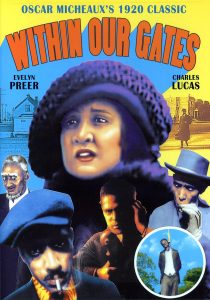
WITHIN OUR GATES
Oscar Micheaux (US 1920) 80 min. 35MM. With Evelyn Preer, Flo Clements, James D. Ruffin.
Oscar Micheaux’s Within Our Gates may be the legendary director’s most provocative film. Made in response to the racism portrayed in Griffith’s The Birth of a Nation, it contains sequences deemed so incendiary that the film was repeatedly cut by censors; in 1992 the Library of Congress restored the film as close to the original as possible. The melodrama follows Sylvia, a young Southern teacher who travels to Boston to seek funding for her school. An extended flashback near the end of the film “refutes the claims of white popular culture with regard to ‘black’ Reconstruction” (Michele Wallace),” showing us how Sylvia’s life was shaped by racial prejudice, lynching, and miscegenation. Preservation print courtesy of the Library of Congress.
TOP OF PAGE
Friday, October 14 at 3pm
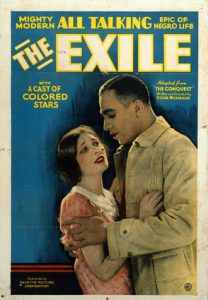
THE EXILE
Oscar Micheaux (U.S. 1931) 78 min. With Eunice Brooks, Stanley Morrell, Celeste Cole.
The first full feature talking picture in Black Cinema is a story of illicit desire that shifts from a Windy City whorehouse to a South Dakota homestead and back again. In his seminal essay “Bad Movies,” J. Hoberman describes Micheaux as the “Black Pioneer of American film—not just because he was a black man, or because in his youth he pioneered the West, or because he was the greatest figure in ‘race’ movies and an unjustly ignored force in early American cinema. Micheaux is America’s Black Pioneer in the way that André Breton was Surrealism’s Black Pope. His movies throw our history and movies into an alien and startling disarray.” Playing with The Darktown Review (Micheaux, 1931, 18 min.)
TOP OF PAGE
Friday, October 21 at 3pm
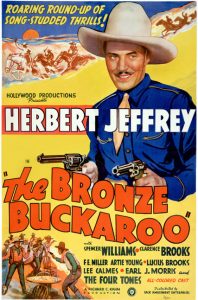
RACE WESTERN DOUBLE FEATURE
A series of 1930s all-black cast Westerns were a popular genre of “race films,” movies made for black audiences and shown in segregated movie houses. In the musical Two-Gun Man from Harlem (Richard Kahn, U.S. 1938, 65 min. With Herb Jeffrey, Spencer Williams, Clarence Brooks), jazz/swing singer Herb Jeffrey plays Bob Blake the singing cowboy. Faithful Mary, the founder of a peace-cult religious movement popular in the black community in the 30s and 40s, appears in the film. The Bronze Buckaroo (Richard Kahn, U.S. 1939, 58 min. With Herb Jeffrey, Flournoy Miller) was filmed on location at an “all-colored” dude ranch in California. Jeffrey is back as the beloved singing cowpoke Bob Blake, “stout of heart, quick of eye, sweet of voice.”
TOP OF PAGE
Friday, October 28 at 3pm
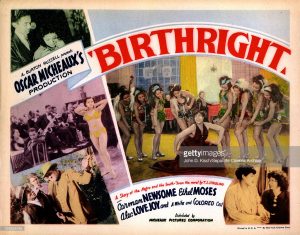
BIRTHRIGHT
Oscar Micheaux (U.S. 1939) 73 min. With Carman Newsome, Ethel Moses, Alec Lovejoy.
An idealistic Harvard grad returns to the segregated South to establish a school, encountering opposition from both races. Featuring Ethel Moses, aka the “Black Harlow,” and a bevy of moonlighting Cotton Club dancers. Restored by the G. William Jones Film and Video Collection of SMU and the Library of Congress. Playing with The Duke is Tops (1938, William L. Nolte/Ralph Cooper, 73 min. With Lena Horne, Ralph Cooper), a backstage musical re-released as The Bronze Venus after the success of Cabin in the Sky and Stormy Weather. Horne’s little-seen film debut is about a producer and his protegé and also features “specialty acts” with historical figures such as Willie Covan and Rubberneck Holmes.
GO DOWN, DEATH!
Spencer Williams (U.S. 1944) 56 min. With Spencer Williams, Samuel H. James, Myra Hemmings.
The title of Spencer Williams’ race film derives from a poem by African-American writer James Weldon Johnson. The third in a trilogy of religious oriented films, Go Down, Death! concerns an African-American community whose new preacher draws away customers from the local juke joint, motivating its owner to try framing the newcomer with a scandalous photograph. Williams’ depiction of hell incorporates clips from the Italian silent film L’Inferno (1911) – some of which brought the film trouble with state censors.
Playing with
DIRTY GERTIE FROM HARLEM U.S.A.
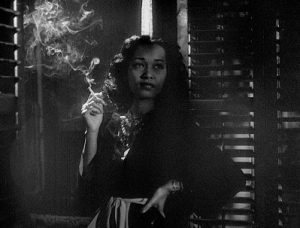 Spencer Williams (U.S. 1946) 60 min. With Francine Everett, Don Wilson, Katherine Moore.
Spencer Williams (U.S. 1946) 60 min. With Francine Everett, Don Wilson, Katherine Moore.
In Spencer Williams’ adaptation of the W. Somerset Maugham short story “Miss Thompson,” nightclub performer Gertie La Rue (Everett) escapes to a Caribbean resort after two-timing her Harlem boyfriend. Ready to entertain the tourists and G.I.s stationed nearby, Gertie must first face the demons of her past, as well as an intolerant reformer who condemns Gertie’s sultry moves. Dirty Gertie was a crossover success for independent director Williams, whose many films stand as a cornerstone of American Black cast productions. In a fabulous cameo, Williams appears as an old fortune-teller who gives Gertie bad news. Restored by Southern Methodist University. [Description courtesy of The Film Studies Center, University of Chicago].
TOP OF PAGE
Friday, November 11 at 3pm
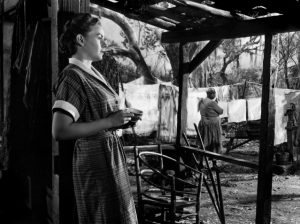
PINKY
Elia Kazan (U.S. 1949) 102 min. DCP. With Jeanne Crain, Ethel Waters, Ethel Barrymore.
Racist bigotry in the Deep South is the subject of Elia Kazan’s vanguard interracial romance. Fearing a Southern boycott, the film’s producer cast a Caucasian actress as Pinky, a pale-skinned African American “passing” as white in Boston who returns to the South to visit her mother and is confronted by her black identity in a racist society. The court of Marshall, Texas found an exhibitor guilty of presenting a film that was “of such a character as to be prejudicial to the best interests of the people of said City.” The case eventually led to a U.S. Supreme Court victory for the film.
TOP OF PAGE
Friday, November 18 at 3pm
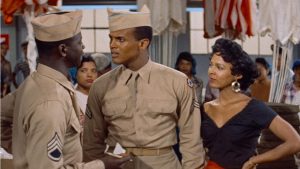
CARMEN JONES
Otto Preminger (U.S. 1954) 105 min. DCP. With Harry Belafonte, Dorothy Dandridge, Pearl Bailey.
Otto Preminger’s daring musical is based on Oscar Hammerstein’s Broadway version of Bizet’s famed opera, here set in the American South during wartime and featuring an all black cast. The pleasure-seeking femme fatale who seduces Harry Belafonte’s G.I. Joe is played by Dorothy Dandridge, whose defiant performance earned her the first Best Actress Oscar nomination for a person of color.
TOP OF PAGE
Friday, December 2 at 3pm
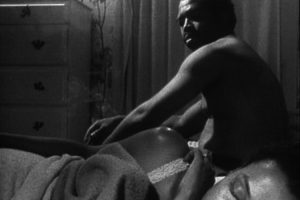
BLESS THEIR LITTLE HEARTS – Restoration Print!
Billy Woodberry (U.S. 1984) 84 min. 35MM. With Nate Hardman, Kaycee Moore, Angela Burnett.
Bless Their Little Hearts represents the closure and pinnacle of a neorealist strand within what’s now described as the L.A. Rebellion. Chronicling the devastating effects of underemployment on a family in the same Los Angeles community depicted in Charles Burnett’s Killer of Sheep (1977), Billy Woodberry pays witness to the ravages of time in the short years since that landmark film. The first-time feature director, who moved into documentary afterward, portrays the daily grind of his characters’ working poverty with emotion, humor and striking realism. Restored by the UCLA Film & Television Archive. [Adapted from notes by Preservationist Ross Lipman.]

